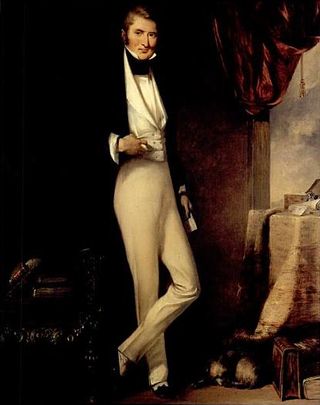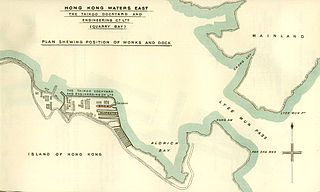
William Jardine was a Scottish physician, opium merchant and trader who co-founded the Hong Kong based conglomerate Jardine, Matheson & Co. Following his return to England from the Far East, between 1841 and 1843, he was Member of Parliament for Ashburton representing the Whig party.

The China Navigation Company. Pte. Ltd. is registered in Singapore — with parent entity The China Navigation Company Limited (CNCo), trading as Swire Shipping & Swire Bulk — is a merchant shipping company based in Singapore. It is part of the Swire group, formerly John Swire and Sons.

The Pacific Mail Steamship Company was founded April 18, 1848, as a joint stock company under the laws of the State of New York by a group of New York City merchants. Incorporators included William H. Aspinwall, Edwin Bartlett, Henry Chauncey, Mr. Alsop, G.G. Howland and S.S. Howland.

Sir James Nicolas Sutherland Matheson, 1st Baronet, FRS, was a Scottish Tai-Pan. Born in Shiness, Lairg, Sutherland, Scotland, he was the son of Captain Donald Matheson. He attended Edinburgh's Royal High School and the University of Edinburgh. He and William Jardine went on to co-found the Hong Kong-based trading conglomerate Jardine Matheson & Co. that became today's Jardine Matheson Holdings.
The Keswick family are a business dynasty of Scottish origin associated with the Far East region since 1855 and in particular the conglomerate Jardine Matheson.

Taikoo Dockyard and Engineering Company was a dockyard in what is now Taikoo Shing, MTR Tai Koo station and part of Taikoo Place of Quarry Bay on the Hong Kong Island in Hong Kong.
China Merchants Group Limited is an international state-owned enterprise (SOE) of the People's Republic of China. The company is operating under the auspices of the Chinese Ministry of Transport.
Steam Navigation Companies became widespread during the 19th century after the development of steam-powered vessels, both steamboats, which were generally used on lakes and rivers, and ocean-faring steamships. Companies that share the name Steam Navigation Company include the following, listed by their country of ownership.

Sylph was a clipper ship built at Sulkea, opposite Calcutta, in 1831 for the Parsi merchant Rustomjee Cowasjee. After her purchase by the Hong Kong-based merchant house Jardine Matheson, in 1833 Sylph set a speed record by sailing from Calcutta to Macao in 17 days, 17 hours. Her primary role was to transport opium between various ports in the Far East. She disappeared en route to Singapore in 1849.

Russell & Company was the largest American trading house of the mid-19th century in China. The firm specialised in trading tea, silk and opium and was eventually involved in the shipping trade.

Dodwell & Co. or Dodwell's, was one of the leading British merchant firms, or hongs, active in China and Japan during the 19th and 20th century. It was a direct rival to Jardine, Matheson & Co.

Jardine, Matheson & Co., later Jardine, Matheson & Co., Ltd., forerunner of today's Jardine Matheson Holdings, was a Far Eastern company founded in 1832 by Scotsmen William Jardine and James Matheson as senior partners. Trafficking opium in Asia, while also trading cotton, tea, silk and a variety of other goods, from its early beginnings in Canton, in 1844 the firm established its head office in the new British colony of Hong Kong then proceeded to expand all along the China Coast.

Jardine Matheson Holdings Limited is a Hong Kong-based Bermuda-domiciled British multinational conglomerate. It has a primary listing on the London Stock Exchange and secondary listings on the Singapore Exchange and Bermuda Stock Exchange. The majority of its business interests are in Asia, and its subsidiaries include Jardine Pacific, Jardine Motors, Hongkong Land, Jardine Strategic Holdings, DFI Retail Group, Mandarin Oriental Hotel Group, Jardine Cycle & Carriage and Astra International. It set up the Jardine Scholarship in 1982 and Mindset, a mental health-focused charity, in 2002.
Apcar and Company was a firm founded in 1819 in India that engaged in shipping, import and export. The most profitable trade was in opium, shipped from India to Hong Kong and the Pearl River. The Apcar Line also carried Indian and Chinese laborers for work in Malaya and Singapore. The line was sold to the British India Steam Navigation Company in 1912.

Samuel Cornell Plant was a British sailor who is best known as the first to command a merchant steamer plying on the Upper Yangtze River in 1900. The Upper Yangtze is the section of river stretching through gorges from Yichang to Chongqing. Plant later collaborated with Chinese merchants and the government to create Sichuan Steam Navigation Company, serving as Captain of SS Shutung and SS Shuhun, providing the first regular merchant steam service on the Upper Yangtze. He is further recognized for his contributions as Chinese Maritime Customs’ First Senior River Inspector on the Upper Yangtze. Plant installed the river's navigational marks, established signaling systems, wrote a manual for shipmasters, and trained hundreds of foreign and Chinese pilots.
William Howell Forbes was an American businessman in Hong Kong. He was the head partner of the Russell & Co. and was the 11th chairman of the board of Directors of Hongkong and Shanghai Banking Corporation from 1879 to 1880. He was the uncle of United States President Franklin Delano Roosevelt.
Chaksang was a 1,923 GRT Hansa A type cargo ship which was built in 1944 as Weserbrück by Deutsche Werft, Hamburg, Germany for Norddeutscher Lloyd. She was seized by the Allies in an incomplete state in 1945 and completed as Empire Fraser for the Ministry of War Transport (MoWT). She was sold in 1946 to the Indo-China Steam Navigation Co Ltd and renamed Chaksang. Suffering an on-board explosion and fire in September 1949, she sank at Hong Kong. She was subsequently raised and scrapped in 1950.

The Hongkong Canton & Macao Steamboat Company was a British merchant shipping and maritime trading company founded in 1865 in the Crown colony of Hong Kong.















